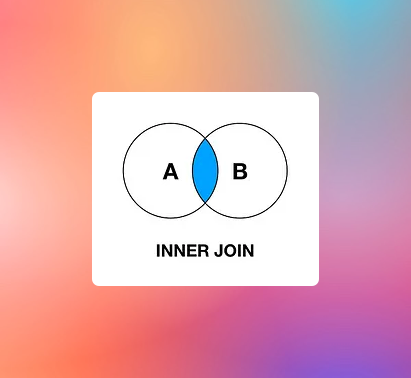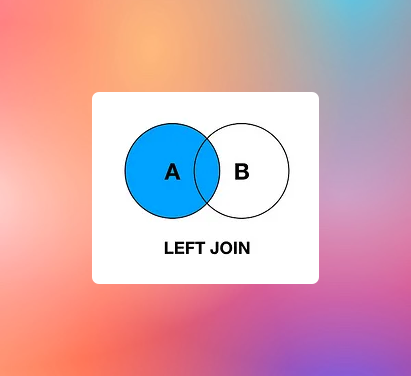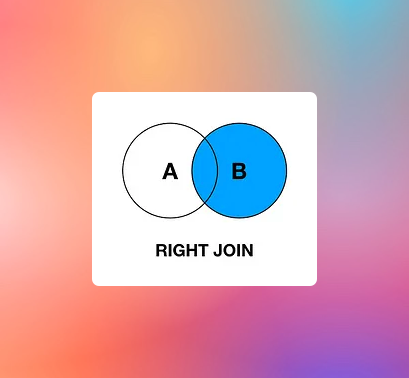How to Join Multiple Tables?
When data is stored in a single table, it is very easy to retrieve rows and apply filter.
However, for real world applications data is stored in multiple tables. In order to retrieve data from multiple tables
join SQL command can be used.
DB2Rest builds on its RSQL core to make it very easy to join more than one table and fetch data.
DB2Rest can join tables and views across multiple databases as well, which is covered in Connect Multiple Databases
Types of Join
SQL JOIN types include:
- INNER JOIN (also known as a ‘simple’ JOIN). This is the most common type of JOIN.
- LEFT JOIN (or LEFT OUTER JOIN)
- RIGHT JOIN (or RIGHT OUTER JOIN)
FULL JOIN (or FULL OUTER JOIN)NOT SUPPORTED- Self JOIN
- Cross JOIN.
The JOIN query is specified as HTTP POST.
If your joining tables have the same column names, then you should use column aliases for those columns, otherwise the endpoint will only return 1 of the columns because of a column name key collision.
The key attributes of request body is described below:
| Sl# | Attribute | Mandatory | Description |
|---|---|---|---|
| 1 | schemaName | N | Schema/Database catalog of the join table. |
| 2 | table | Y | Table to join with the root table. |
| 3 | fields | N | List of columns to retrieve from join tables |
| 4 | joinType | N | Type of join - allowed values - INNER, LEFT, RIGHT, OUTER, CROSS. Default value : INNER |
| 5 | on | N | Join columns. |
| 6 | withTable | N | Join with another table. |
| 7 | filter | N | Filter the data using RSQL filter. The column filter uses RSQL syntax as described here. |
Inner Join
INNER JOIN selects records that have matching values in both tables.

The example below shows how to join review table with film to retrieve all the reviews for each film.
- cURL
- HTTPie
$ curl 'http://localhost:8080/v1/rdbms/db/review/_expand' -i -X POST \
-H 'Content-Type: application/json' \
-H 'Accept: application/json' \
-d '[{"table":"film","fields":["title","release_year"],"joinType":"INNER","on":["film_id==film_id"]}]'
$ echo '[{"table":"film","fields":["title","release_year"],"joinType":"INNER","on":["film_id==film_id"]}]' | http POST 'http://localhost:8080/v1/rdbms/db/review/_expand' \
'Content-Type:application/json' \
'Accept:application/json'
The response from this query is shown below.
HTTP/1.1 200 OK
Content-Type: application/json
Content-Length: 174
[
{
"review_id":"ABC123",
"message":"Awesome movie",
"rating":4,
"film_id":1,
"last_update":"2024-03-10T08:20:59.000+00:00",
"title":"ACADEMY DINOSAUR",
"release_year":"2006-01-01"
}
]
Inner Join - Multiple Tables
The example below joins multiple tables to retrieve data. In this case the film table is joined with
junction/join table film_actor and actor to retrieve the list of film with the actors involved.
- cURL
- HTTPie
curl --request POST \
--url http://localhost:8080/v1/rdbms/db/film/_expand \
--header 'Content-Type: application/json' \
--header 'User-Agent: insomnia/8.6.1' \
--data '[
{
"table": "film_actor",
"fields" : ["film_id"],
"on" : ["film_id==film_id"]
},
{
"table": "actor",
"fields" : ["actor_id","first_name", "last_name"],
"on" : ["actor_id==actor_id"]
}
]
'
echo '[
{
"table": "film_actor",
"fields" : ["film_id"],
"on" : ["film_id==film_id"]
},
{
"table": "actor",
"fields" : ["actor_id","first_name", "last_name"],
"on" : ["actor_id==actor_id"]
}
]
' | \
http POST http://localhost:8080/v1/rdbms/db/film/_expand \
Content-Type:application/json \
User-Agent:insomnia/8.6.1
Left Join
The LEFT JOIN keyword returns all records from the left table (A), and the matching records from the right table (B).
The result is 0 records from the right side, if there is no match.

- cURL
- HTTPie
$ curl 'http://localhost:8080/v1/rdbms/db/users/_expand' -i -X POST \
-H 'Content-Type: application/json' \
-H 'Accept: application/json' \
-d '[{"table":"userprofile","fields":["apid","auid","firstname","lastname","email","phone"],"joinType":"LEFT","on":["auid==auid"]}]'
$ echo '[{"table":"userprofile","fields":["apid","auid","firstname","lastname","email","phone"],"joinType":"LEFT","on":["auid==auid"]}]' | http POST 'http://localhost:8080/v1/rdbms/db/users/_expand' \
'Content-Type:application/json' \
'Accept:application/json'
This will return the following result:
HTTP/1.1 200 OK
Content-Type: application/json
Content-Length: 730
[
{
"auid": 1,
"username": "admin",
"password": "pswrd123",
"createdate": "2024-03-10T00:00:00",
"isActive": true,
"apid": 1,
"firstname": "Jack",
"lastname": "Wolf",
"email": "[email protected]",
"phone": "600075764216"
},
{
"auid": 2,
"username": "admin1",
"password": "pass506",
"createdate": "2024-03-10T00:00:00",
"isActive": true,
"apid": null,
"firstname": null,
"lastname": null,
"email": null,
"phone": null
},
{
"auid": 4,
"username": "fox12",
"password": "45@jgo0",
"createdate": "2024-03-10T00:00:00",
"isActive": true,
"apid": null,
"firstname": null,
"lastname": null,
"email": null,
"phone": null
},
{
"auid": 6,
"username": "lexus1267",
"password": "98hnfRT6",
"createdate": "2024-03-10T00:00:00",
"isActive": true,
"apid": null,
"firstname": null,
"lastname": null,
"email": null,
"phone": null
}
]
Right Join
The RIGHT JOIN keyword returns all records from the right table (B), and the matching records from the left table (A).
The result is 0 records from the left side, if there is no match.

- cURL
- HTTPie
$ curl 'http://localhost:8080/v1/rdbms/db/users/_expand' -i -X POST \
-H 'Content-Type: application/json' \
-H 'Accept: application/json' \
-d '[{"table":"userprofile","fields":["apid","auid","firstname","lastname","email","phone"],"joinType":"RIGHT","on":["auid==auid"]}]'
$ echo '[{"table":"userprofile","fields":["apid","auid","firstname","lastname","email","phone"],"joinType":"RIGHT","on":["auid==auid"]}]' | http POST 'http://localhost:8080/v1/rdbms/db/users/_expand' \
'Content-Type:application/json' \
'Accept:application/json'
This will return the following result:
HTTP/1.1 200 OK
Content-Type: application/json
Content-Length: 741
[
{
"auid":1,
"username":"admin",
"password":"pswrd123",
"createdate":"2024-03-10T00:00:00",
"isActive":true,
"apid":1,
"firstname":"Jack",
"lastname":"Wolf",
"email":"[email protected]",
"phone":"600075764216"
},
{
"auid":3,
"username":null,
"password":null,
"createdate":null,
"isActive":null,
"apid":2,
"firstname":"Tom",
"lastname":"Collins",
"email":"[email protected]",
"phone":"878511311054"
},
{
"auid":5,
"username":null,
"password":null,
"createdate":null,
"isActive":null,
"apid":4,
"firstname":"Bill",
"lastname":"Fonskin",
"email":"[email protected]",
"phone":"450985764216"
},
{
"auid":7,
"username":null,
"password":null,
"createdate":null,
"isActive":null,
"apid":7,
"firstname":"Ivan",
"lastname":"Levchenko",
"email":"[email protected]",
"phone":"878511311054"
}
]
Self Join
A self join is a regular join, but the table is joined with itself.
- cURL
- HTTPie
curl --request POST \
--url 'http://localhost:8080/v1/rdbms/db/film/_expand?fields=title' \
--header 'Content-Type: application/json' \
--header 'User-Agent: insomnia/8.6.1' \
--data '[
{
"table": "film",
"fields" : ["title", "release_year:releaseYear"],
"on" : ["film_id==prequel_film_id"]
}
]
'
echo '[
{
"table": "film",
"fields" : ["title", "release_year:releaseYear"],
"on" : ["film_id==prequel_film_id"]
}
]
' | \
http POST 'http://localhost:8080/v1/rdbms/db/film/_expand?fields=title' \
Content-Type:application/json \
User-Agent:insomnia/8.6.1
Self Join - with compound condition
- cURL
- HTTPie
curl --request POST \
--url 'http://localhost:8080/v1/rdbms/db/film/_expand?fields=title' \
--header 'Content-Type: application/json' \
--header 'User-Agent: insomnia/8.6.1' \
--data '[
{
"table": "film",
"fields" : ["title", "release_year"],
"on" : ["film_id==prequel_film_id","release_year=lt=release_year"]
}
]
'
echo '[
{
"table": "film",
"fields" : ["title", "release_year"],
"on" : ["film_id==prequel_film_id","release_year=lt=release_year"]
}
]
' | \
http POST 'http://localhost:8080/v1/rdbms/db/film/_expand?fields=title' \
Content-Type:application/json \
User-Agent:insomnia/8.6.1
Self Join - with compound condition and filter
- cURL
- HTTPie
curl --request POST \
--url 'http://localhost:8080/v1/rdbms/db/film/_expand?fields=title:name&filter=rental_duration==4' \
--header 'Content-Type: application/json' \
--header 'User-Agent: insomnia/8.6.1' \
--data '[
{
"table": "film",
"fields" : ["title:prequelTitle", "release_year"],
"on" : ["film_id==prequel_film_id","release_year=lt=release_year"],
"filter" : "release_year=gt=2020"
}
]
'
echo '[
{
"table": "film",
"fields" : ["title:prequelTitle", "release_year"],
"on" : ["film_id==prequel_film_id","release_year=lt=release_year"],
"filter" : "release_year=gt=2020"
}
]
' | \
http POST 'http://localhost:8080/v1/rdbms/db/film/_expand?fields=title:name&filter=rental_duration==4' \
Content-Type:application/json \
User-Agent:insomnia/8.6.1
Cross Join
A cross join returns the Cartesian product of rows from the tables included in the join. It does not require any join condition. In other words, it will combine each row from the first table with each row from the second table.
This is potentially an expensive and dangerous operation since it can lead to a large data explosion.
- cURL
- HTTPie
$ curl 'http://localhost:8080/v1/rdbms/db/tops/_expand' -i -X POST \
-H 'Content-Type: application/json' \
-H 'Accept: application/json' \
-d '[{"table":"bottoms","fields":["bottom_item","color:botColor","size:botSize"]}]'
$ echo '[{"table":"bottoms","fields":["bottom_item","color:botColor","size:botSize"]}]' | http POST 'http://localhost:8080/v1/rdbms/db/tops/_expand' \
'Content-Type:application/json' \
'Accept:application/json'
Combine Inner and Outer Join
Following along with our syntax in the URL below,
here we are fetching the field title from our film database and renaming it with an alias of name.
The max rows returned is the default 100, since we are not specifying the limit parameter.
The data asks to join it with the language table, and further, we ask to left join (extend) each film
with altLangId and altLangName when its language_id matches the original_language_id.
- cURL
- HTTPie
curl --request POST \
--url 'http://localhost:8080/v1/rdbms/db/film/_expand?fields=title:name' \
--header 'Content-Type: application/json' \
--header 'User-Agent: insomnia/8.6.1' \
--data '[
{
"table": "language",
"fields" : ["language_id:langId", "name:langName"],
"on" : ["language_id==language_id"]
},
{
"table": "language",
"withTable" : "film",
"type" : "LEFT",
"fields" : ["language_id:altLangId", "name:altLangName"],
"on" : ["original_language_id==language_id"]
}
]
'
echo '[
{
"table": "language",
"fields" : ["language_id:langId", "name:langName"],
"on" : ["language_id==language_id"]
},
{
"table": "language",
"withTable" : "film",
"type" : "LEFT",
"fields" : ["language_id:altLangId", "name:altLangName"],
"on" : ["original_language_id==language_id"]
}
]
' | \
http POST 'http://localhost:8080/v1/rdbms/db/film/_expand?fields=title:name' \
Content-Type:application/json \
User-Agent:insomnia/8.6.1
This will return the following result: (truncated)
HTTP/1.1 200 OK
Content-Type: application/json
Content-Length: 730
[
{
"name": "ACADEMY DINOSAUR",
"langId": 1,
"langName": "English",
"altLangId": null,
"altLangName": null
},
{
"name": "ACE GOLDFINGER",
"langId": 1,
"langName": "English",
"altLangId": null,
"altLangName": null
},
{
"name": "ADAPTATION HOLES",
"langId": 1,
"langName": "English",
"altLangId": null,
"altLangName": null
},
{
"name": "AFFAIR PREJUDICE",
"langId": 1,
"langName": "English",
"altLangId": null,
"altLangName": null
},
......
]